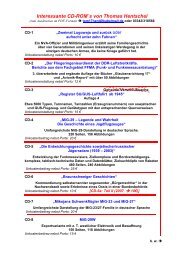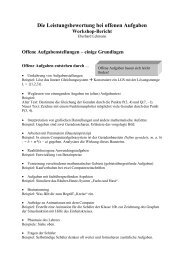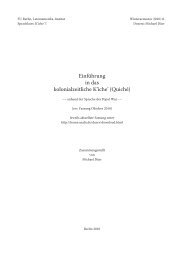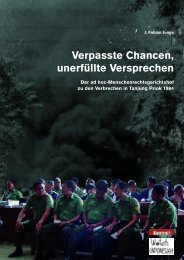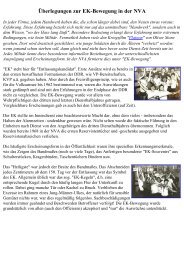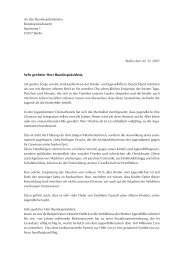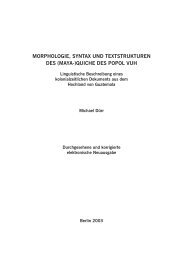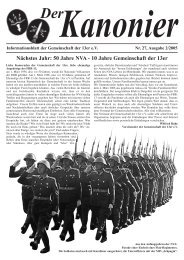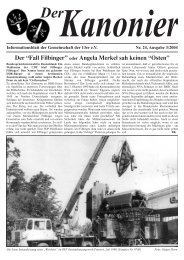SHADOW BOXING: INDONESIAN WRITERS ... - home . snafu . de
SHADOW BOXING: INDONESIAN WRITERS ... - home . snafu . de
SHADOW BOXING: INDONESIAN WRITERS ... - home . snafu . de
Create successful ePaper yourself
Turn your PDF publications into a flip-book with our unique Google optimized e-Paper software.
Shadow Boxing 163<br />
the first studies of the way in which an Indonesian writer has drawn on and poked fun<br />
at the wayang world. Scherer's study highlighted the manner in which Yudhistira<br />
manipulates the themes of the wayang to un<strong>de</strong>rmine the selfish interests of the New<br />
Or<strong>de</strong>r elite and the kawula-gusti feudal ethos. The most distinguishing aspect of<br />
Yudhistira's two novels experimenting with the wayang—Arjuna Mencari Cinta (Arjuna<br />
Searching for Love) (1977) and Arjuna Drop-Out (1980)—is the way in which<br />
Yudhistira's "wayang characters" are humorously <strong>de</strong>picted as fully humanized<br />
suburban Indonesians. 19 In this sense they are no longer wayang characters as such, but<br />
rather Indonesian teenagers and adults merely named after various characters in the<br />
Mahabharata. The malicious irony in their naming lies in how the relationships between<br />
the literary characters differ from their wayang namesakes. For example, in wayang<br />
narratives, Aswatama, one of the worst of the Kurawa, completely violates ksatria<br />
ethics by treacherously mur<strong>de</strong>ring two women, Banowati and Srikandi, as well as<br />
attempting to kill Parikesit, who was, at the time, a mere baby in his cradle.<br />
Meanwhile, in Yudhistira's Arjuna Drop-Out, Aswatama is portrayed as an honest<br />
bank clerk who, "stupidly" refuses to indulge himself in corruption, <strong>de</strong>spite being in<br />
the midst of "a corrupt environment and its corrupt society/' 20<br />
As Benedict An<strong>de</strong>rson observes in "Sembah-Sumpah: The Politics of Language and<br />
Javanese Culture," when Yudhistira steals the wayang heroes and plunges them into the<br />
"borne bourgeois world of contemporary Jakarta," he impu<strong>de</strong>ntly unleashes his malice<br />
towards not only the ruling elite, "an establishment still sunk in the residues of colonial<br />
Javanese culture," but also the feudalism of Javanese culture itself. 21 An<strong>de</strong>rson also<br />
highlights Yudhistira's usage of the Indonesian language. An<strong>de</strong>rson suggests that<br />
Yudhistira's incorporation of quotes and allusions from various languages and cultures<br />
would have been virtually impossible in Javanese, and besi<strong>de</strong>s, the whole point of<br />
Yudhistira's use of Indonesian for his texts was "precisely to put Java in its place." 22<br />
As a means of cultural resistance, the translation of the wayang into mo<strong>de</strong>rn<br />
literary forms of expression continued throughout the latter half of the New Or<strong>de</strong>r era,<br />
if anything intensifying during the 1980s and 1990s. Why was the wayang so<br />
extensively explored and exploited for political and literary reasons in the New<br />
Or<strong>de</strong>r? The most obvious explanations involve politics and censorship. The first kind<br />
of explanation lies in the "dynastic" style of Suharto and his government, and in<br />
Suharto's penchant for alluding to the world of the wayang. Certainly from very early<br />
on in his political career, like his pre<strong>de</strong>cessor, Suharto perceived the need to link the<br />
political and the mythological. Much has been ma<strong>de</strong> of Suharto's early links with<br />
Semar, the popular wayang clown-god, and in his semi-official biography, there is a<br />
photo of a youthful Suharto posing in his presi<strong>de</strong>ntial office in front of a large painting<br />
<strong>de</strong>picting Hanoman fighting Rahwana. 23 However, in terms of political style, Suharto's<br />
19 Yudhistira Ardi Noegraha, Arjuna Mencari Cinta (Jakarta: Cypress, 1977); Yudhistira Ardi Noegraha,<br />
Arjuna Drop-Out (Jakarta: Cypress, 1980).<br />
20 "lingkungan dan masyarakatnya yang korup!" Yudhistira, Arjuna Drop-Out, p. 113.<br />
21 Benedict R. O'G. An<strong>de</strong>rson, "Sembah-Sumpah: The Politics of Language and Javanese Culture/' in<br />
Language and Power: Exploring Political Cultures in Indonesia (Ithaca: Cornell University Press, 1990), esp.<br />
pp. 227-235.<br />
22 Ibid., p. 235.<br />
23 See O. G. Roe<strong>de</strong>r, The Smiling General (Jakarta: Gunung Agung, 1969), p. ii.



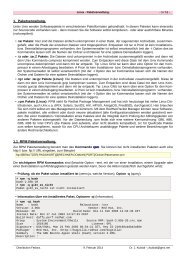
![Parameterdarstellungen [ x(t), y(t) ] Eberhard ... - home . snafu . de](https://img.yumpu.com/22517728/1/184x260/parameterdarstellungen-xt-yt-eberhard-home-snafu-de.jpg?quality=85)
